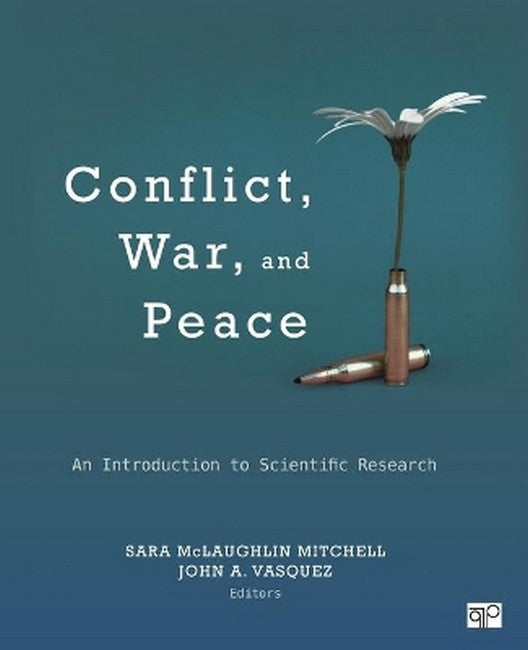Michael A. Messner is professor of sociology and gender studies at the University of Southern California. His teaching and research focuses on men and feminism, gender and sports, gender-based violence, war and peace, and social movements. He is the author of several books, including Some men: Feminist allies and the movement to end violence against women (Oxford University Press, 2015), and most recently Guys like me: Five wars, five veterans for peace (Rutgers University Press, 2019) . His honors include the Pursuit of Justice Award from the California Women's Law Center, the Feminist Mentoring Award from the Sociologists for Women in Society, and the Jessie Bernard Award, presented by the American Sociological Association in recognition of contributions to the understanding of women's lives. http://www.michaelmessner.org/ John A. Vasquez is the Thomas B. Mackie Scholar in International Relations at the University of Illinois at Urbana-Champaign. The author of The War Puzzle Revisited (2009), he has served as president of the Peace Science Society (International) and the International Studies Association.
Request Academic Copy
Please copy the ISBN for submitting review copy form
Description
Part I: Overview 1. Introduction - Sara McLaughlin Mitchell and John A. Vasquez 2. Dangerous Dyads: Conditions Affecting the Likelihood of Interstate War, 1816-1965 - Stuart A. Bremer Major Contributions: Dangerous Dyads Methodological Notes: Probabilities Part II: Dangerous Dyads 3. Bones of Contention: Comparing Territorial, Maritime, and River Issues - Paul R. Hensel, Sara McLaughlin Mitchell, Thomas E. Sowers II, and Clayton L. Thyne Major Contributions: Territorial Conflict Methodological Notes: Log Odds, Logit Model, and Substantive Significance 4. Alliances and the Expansion and Escalation of Militarized Interstate Disputes - Brett Ashley Leeds Major Contributions: Alliances Methodological Notes: Selection Bias 5. The New Rivalry Dataset: Procedures and Patterns - James P. Klein, Gary Goertz, and Paul F. Diehl Major Contributions: Rivalry Methodological Notes: Percentages, Reliability, and Validity 6. The Outcomes of Military Buildups: Minor States vs. Major Powers - Susan G. Sample Major Contributions: Arms Races Methodological Notes: Statistical Significance and Control Variables 7. Assessing the Steps to War - Paul D. Senese and John A. Vasquez Major Contributions: The Steps to War Methodological Notes: Research Design and Measurement 8. Rivalry and Diversionary Uses of Force - Sara McLaughlin Mitchell and Brandon C. Prins Major Contributions: Diversionary Theory Methodological Notes: Interaction Terms and the GEE Model Part III: Peaceful Dyads 9. The Kantian Peace: The Pacific Benefits of Democracy, Interdependence, and International Organizations, 1885-1992 - John R. Oneal and Bruce Russett Major Contributions: Democratic Peace Methodological Notes: Levels of Analysis 10. Economic Interdependence: A Path to Peace or a Source of Interstate Conflict? - Katherine Barbieri Major Contributions: Economic Interdependence Methodological Notes: Missing Data 11. A Unified Statistical Model of Conflict Onset and Escalation - William Reed Major Contributions: Power Preponderance Methodological Notes: Selection (Censored Probit) Models 12. Bordering on Peace: Democracy, Territorial Issues, and Conflict - Douglas M. Gibler Major Contributions: Territorial Peace Methodological Notes: Spurious Relationships 13. Proliferation and International Crisis Behavior - Victor Asal and Kyle Beardsley Major Contributions: Nuclear Weapons Methodological Notes: Ordered Logit Models Part IV: Outcomes & Consequences of War 14. The Precarious Nature of Peace: Resolving the Issues, Enforcing the Settlement, and Renegotiating the Terms - Suzanne Werner Major Contributions: Enforcing Settlements Methodological Notes: Duration (Weibull) Models 15. War and the Survival of Political Leaders: A Comparative Study of Regime Types and Political Accountability - Bruce Bueno de Mesquita and Randolph M. Siverson Major Contributions: Leader Survival Methodological Notes: Game Theory Models
The examined contributions by names such as Stuart Bremer, Paul F. Diehl, John A. Vasquez, Bruce Russet, Bruce Bueno de Mesquita and Randolph M. Siverson are followed by a methodological note that explains with clarity and precision the contribution to knowledge and the methods used. The originality consists in the process of breaking down what researchers take for granted and adapting it to the undergraduate level of understanding. Against this background, the book addresses a missing link in the module and course handbooks and takes the form of a curated set of lessons in research methods aimed to 'highlight some of the key research studies on interstate conflict'. -- Vladimir Rauta, University of Nottingham

